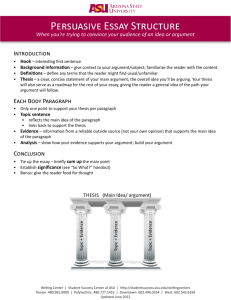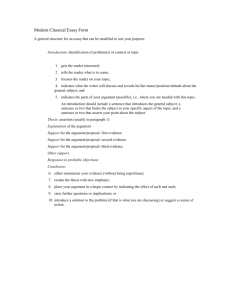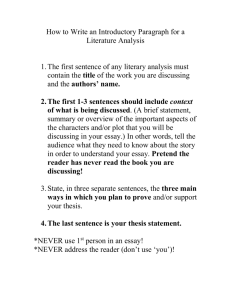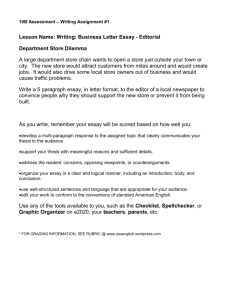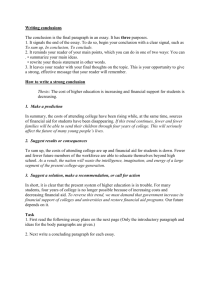Summary Versus Analysis
advertisement
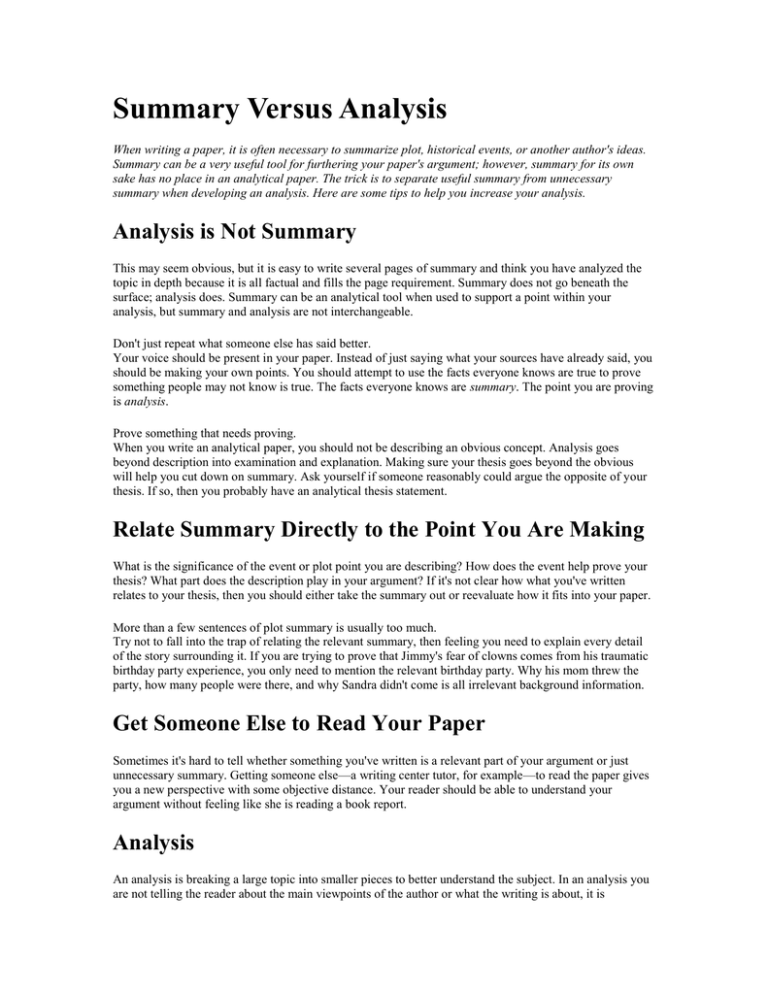
Summary Versus Analysis When writing a paper, it is often necessary to summarize plot, historical events, or another author's ideas. Summary can be a very useful tool for furthering your paper's argument; however, summary for its own sake has no place in an analytical paper. The trick is to separate useful summary from unnecessary summary when developing an analysis. Here are some tips to help you increase your analysis. Analysis is Not Summary This may seem obvious, but it is easy to write several pages of summary and think you have analyzed the topic in depth because it is all factual and fills the page requirement. Summary does not go beneath the surface; analysis does. Summary can be an analytical tool when used to support a point within your analysis, but summary and analysis are not interchangeable. Don't just repeat what someone else has said better. Your voice should be present in your paper. Instead of just saying what your sources have already said, you should be making your own points. You should attempt to use the facts everyone knows are true to prove something people may not know is true. The facts everyone knows are summary. The point you are proving is analysis. Prove something that needs proving. When you write an analytical paper, you should not be describing an obvious concept. Analysis goes beyond description into examination and explanation. Making sure your thesis goes beyond the obvious will help you cut down on summary. Ask yourself if someone reasonably could argue the opposite of your thesis. If so, then you probably have an analytical thesis statement. Relate Summary Directly to the Point You Are Making What is the significance of the event or plot point you are describing? How does the event help prove your thesis? What part does the description play in your argument? If it's not clear how what you've written relates to your thesis, then you should either take the summary out or reevaluate how it fits into your paper. More than a few sentences of plot summary is usually too much. Try not to fall into the trap of relating the relevant summary, then feeling you need to explain every detail of the story surrounding it. If you are trying to prove that Jimmy's fear of clowns comes from his traumatic birthday party experience, you only need to mention the relevant birthday party. Why his mom threw the party, how many people were there, and why Sandra didn't come is all irrelevant background information. Get Someone Else to Read Your Paper Sometimes it's hard to tell whether something you've written is a relevant part of your argument or just unnecessary summary. Getting someone else—a writing center tutor, for example—to read the paper gives you a new perspective with some objective distance. Your reader should be able to understand your argument without feeling like she is reading a book report. Analysis An analysis is breaking a large topic into smaller pieces to better understand the subject. In an analysis you are not telling the reader about the main viewpoints of the author or what the writing is about, it is examining the structure and the details of the writing. You break the story into smaller parts to understand it better. Many instructors do not want you to express your opinion about the subject discussed in the paper. You can only give your opinion on how well the author did to convince the reader. The first paragraph should be the introductory paragraph and it should include the title, author’s name, and publication details. You can also give the reader some background information on the subject being discussed in the writing and then give the thesis statement of the paper. First paragraph can also have a short summary about the paper. In your analysis paper, you should address what is the main argument that the author is making and how well do they support the argument. The other factor to address is how reliable are the sources, and the authority that the author cites to make their argument strong. An analysis paper can also include the strengths and weaknesses of the paper and how they affect the argument being made by the author. You should also examine the tools like statistics, examples or citing of an authority to analyze the author’s reasoning for writing the paper. The other points one could address in their analysis paper are does the author address the opposition’s view point and does he/she attempts to refute it. Many instructors do not want you to express your opinion about the subject discussed in the paper. You can only give your opinion on how well the author did to convince the reader. However, depending on your class level and your instructor it might be different and you might be allowed to express your opinion on the subject matter and tell whether you agree or disagree with the author. It is very easy for many students to confuse analysis with a summary. They both have few similarities in the introductory paragraph but overall they have different structures. Most of the analyses or summaries will include many of the factors that I have listed above but you should always ask your instructors about what structure and guidelines they want you to follow. The structure and the information you put in your summary or analysis might also differ because of your class. Analysis An analysis is breaking a large topic into smaller pieces to better understand the subject. In an analysis you are not telling the reader about the main viewpoints of the author or what the writing is about, it is examining the structure and the details of the writing. You break the story into smaller parts to understand it better. Many instructors do not want you to express your opinion about the subject discussed in the paper. You can only give your opinion on how well the author did to convince the reader. The first paragraph should be the introductory paragraph and it should include the title, author’s name, and publication details. You can also give the reader some background information on the subject being discussed in the writing and then give the thesis statement of the paper. First paragraph can also have a short summary about the paper. In your analysis paper, you should address what is the main argument that the author is making and how well do they support the argument. The other factor to address is how reliable are the sources, and the authority that the author cites to make their argument strong. An analysis paper can also include the strengths and weaknesses of the paper and how they affect the argument being made by the author. You should also examine the tools like statistics, examples or citing of an authority to analyze the author’s reasoning for writing the paper. The other points one could address in their analysis paper are does the author address the opposition’s view point and does he/she attempts to refute it. Many instructors do not want you to express your opinion about the subject discussed in the paper. You can only give your opinion on how well the author did to convince the reader. However, depending on your class level and your instructor it might be different and you might be allowed to express your opinion on the subject matter and tell whether you agree or disagree with the author. It is very easy for many students to confuse analysis with a summary. They both have few similarities in the introductory paragraph but overall they have different structures. Most of the analyses or summaries will include many of the factors that I have listed above but you should always ask your instructors about what structure and guidelines they want you to follow. The structure and the information you put in your summary or analysis might also differ because of your class. How to Write a Response What Do You Think? Does this Article Persuade You? Generally, your response will be the end of your essay, but you may include your response throughout the paper as you select what to summarize and analyze. Your response will also be evident to the reader by the tone that you use and the words you select to talk about the article and writer. However, your response in the conclusion will be more direct and specific. It will use the information you have already provided in your summary and analysis to draw a conclusion about how you feel about this article. Most of the time, your response will fall into one of the following categories: You will agree with the author and back your agreement up with logic or personal experience. You will disagree with the author because of your experience or knowledge (although you may have sympathy with the author's position). You will agree with part of the author's points and disagree with other points . You will agree or disagree with the author but feel that there is a more important or different point which needs to be discussed in addition to what is in the article. How will this article fit into your own paper? How will you be able to use it? Here are some questions you can ask to help you think about your response: 1. 2. 3. 4. 5. 6. What is your personal reaction to the essay? What common ground do you have with the author? How are your experiences the same or different from the authors and how has your experience influenced your view? What in the essay is new to you? What information do you know which is not contained in the article but is relevant to the topic? What in this essay made you re-think your own view? What does this essay make you think about? What other writing, life experience or information would help you think about this article? What do you like or dislike about the essay and/or the ideas in the essay? How much of this is related to your personal experiences? How much is related to your own worldview? How is this feeling related to information you know? How will this information be useful for you in writing your Exploratory essay? What position does this essay support? Or where might you use this article in your essay? To write an analysis, you need to think about how each part of something contributes to the success of the whole. Caution! Make sure that you're NOT just summarizing the original article, story, novel, poem, etc. Go beyond simply telling us WHAT you are talking about: describe HOW and WHY its elements function. Specific Information for Analyzing Literature Summarizing = WHAT Analyzing = HOW & WHY When you think about analysis, try thinking about how you might analyze a car. Ask yourself: What do we want the car to do or accomplish? o Answer: (minivan) “provide transportation for my family” Analysis: how does each part of the van achieve this goal? Example: gasoline powers the engine o Answer: (sports car) “speed, agility, and style” Analysis: how does each part of the sports car achieve this goal? Example: light-weight construction enables speed


